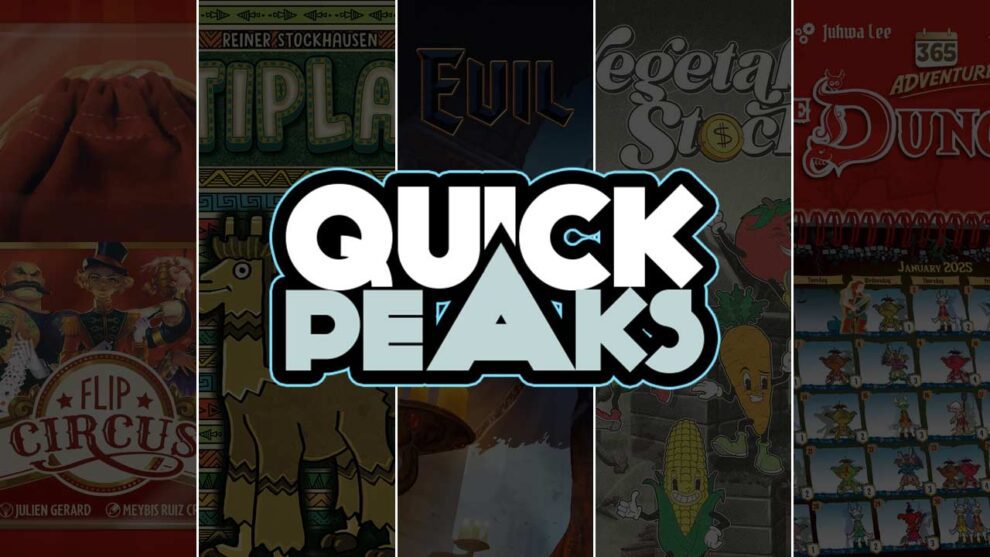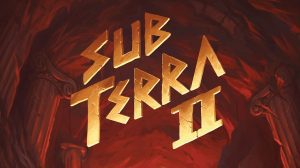Flip Circus – Justin Bell
Flip Circus (2024, IELLO) is a 10-minute, two-player-only, circus-themed memory game. Players arrange a ring of ten double-sided poker chips, with either a clown or a performer on each side. The performers come in five different flavors: fortune teller, strongman, acrobat, magician, and animal tamer. On a turn, players do their best to use two actions and the various powers of each token to create three matching performer icons. Clowns are used to win Applause tokens, which grant their owner extra actions, while the performers are scored once each game for the player that first gets the performer chips to be arranged in a match. (Chips remain in the ring for the entire game.) The first person to get three matches wins.
For a quick game, Flip Circus has a surprising number of rules. A game that starts as a simple matching game quickly becomes a head scratcher. That’s because two of the five performers have ongoing rule effects that limit their ability to be moved and/or flipped, and the other three performers have their own powers as well.
The game gets one thing right: every single game needs a player aid, and Flip Circus knows that it has one too many rules for new players to try and remember. But in our single play, I got my first three-performer match almost by accident, and my third because I made a 50/50 guess on what was on the flip side of one of the poker chips to win. Flip Circus is not quite a memory game and it’s too complicated to recommend as a casual, 10-minute experience. It’s also not quite a two-player-only game: there’s a variant that pits two teams of two players each against each other…while not changing the majority of the core rules. That leaves Flip Circus in a very tricky place.
Ease of entry?:
★★★☆☆ – There were a few questions
Would I play it again?:
★★☆☆☆ – Would play again but would rather play something else
Read more articles from Justin Bell.
Altiplano – Tom Franklin
Another game that sat on my Shelf o’ Shame for far too long, I brought Altiplano to our weekly game night and was chided for not bringing it sooner. (“Why did you wait so long? This game is fun!” was one comment.)
Riffing on the deck builder concept (Dominion, Concordia, etc.), Altiplano is a bag builder. You accumulate chits (instead of cards) which are placed in a bag. A certain number are drawn blind at the start of each turn. (The popular Quacks of Quedlinburg uses this mechanic) You’ll place those chits on your player board to determine your actions for that round—if you can get to the tile where those actions take place. You start off with a movement of 1-3 places around the board, but then you’ll have to pay to take extra movements.
I am not a big fan of luck-based games. Show me a d6 and I’m ready to walk away. At one point in our first game, the bag drawing aspect of Altiplano started to feel more like a roll of the dice than drawing from the top of a deck. I realized, for me, games like Dominion don’t feel as luck-based because turns move so quickly. Altiplano is a slower game, where you’re not just reacting to the cards/chits drawn on each turn, you have to plan out how you’re going to use each one. And which you’re going to place somewhere and hope to get to later.
One of my weekly group has said he likes the challenge of figuring out how to best use the randomness he’s presented with in dice games. That’s what I’m trying to lean into with Altiplano. So far, it’s working.
Ease of entry?:
★★★★☆ – The odd bump or two
Would I play it again?:
★★★★☆ – Would like to play it again
Read more articles from Tom Franklin.
Evil High Priest – K. David Ladage
My friend, Steve, has a lot of games that would fall into the H. P. Lovecraft sphere of influence. His game room is decorated in Cthuloid tentacles and the like. This is a theme of which he is fond. So when he pulled out Evil High Priest as a palate cleanser (after a nine-hour game of Twilight Imperium 4e), it was not a surprise to anyone. It is a relatively straightforward worker-placement game, with some interesting and often deep variations depending upon which big-bad you chose to go against, what investigators show up attempting to foil your plans, what monstrosities you can summon to protect the lair you are building, and so on. All of it was very enjoyable and had me thinking about my next move carefully. A good time was had! I certainly hope he pulls that one out again sometime soon.
Check out our review of Evil High Priest.
Ease of entry?:
★★★★☆ – The odd bump or two
Would I play it again?:
★★★★☆ – Would like to play it again
Read more articles from K. David Ladage.
Vegetable Stock – Justin Bell
Vegetable Stock is a Taiwanese game from 2019 that was recently published by Arcane Wonders for distribution in the US. Although it didn’t look like much at first glance, we recently did a six-player game and were surprised by how hard we laughed in the final two rounds. (The Cuphead-style artwork doesn’t hurt either.) Players take on the role of investors who draft a single card each round featuring three shares in the hopes that their stocks in five different vegetables (broccoli, carrots, corn, eggplant, and the somewhat-questionable inclusion of tomatoes) will be worth anything by the end of the game.
That’s because the market for each stock is constantly changing, thanks to a simple rule: a card market of stocks equal to one plus the player count means that one card is left over after each player drafts a card into their tableau. But the last card is used to raise the price of each stock pictured on that card. This leads to some values going up, but if a stock ever reaches the top of its market, that stock crashes, and has to start again at zero in the next round. Timing this out for the final round was interesting, and it meant some players ended up with almost no value by the end of the game while others were filthy rich. For a game that plays in about 10 minutes, there’s enough going on in Vegetable Stock to recommend this as a light, fun party game for nearly any age group.
Check out our review of Vegetable Stock.
Ease of entry?:
★★★★★ – No sweat
Would I play it again?:
★★★☆☆ – Wouldn’t suggest it, but would happily play it
Read more articles from Justin Bell.
365 Adventures: The Dungeon – Justin Bell
During my SPIEL 2024 meeting with the team at Sorry We Are French—the fantastic publisher under the Hachette distribution banner that gave us Zhanguo: The First Empire and Shackleton Base: A Journey to the Moon—our contact handed me a small box and a neoprene dice tray with the title 365 Adventures: The Dungeon. I didn’t even think it was a game when I looked at the box, but I said thanks and moved to my next meeting.
When I got the game to my house, I discovered the truth—365 Adventures: The Dungeon IS in fact a game, in the form of a once-a-day calendar that features a magnet used as a character that moves through a “dungeon” (really, just a monthly desk calendar) fighting against monsters and bosses by asking players to roll a set of five dice using a Yahtzee-style re-roll format. The goal? Beat one of the baddies in the active row of the week’s days, by getting three-of-a-kind for minions and a minimum pip value threshold for the bosses. Total up your score for the week, the month, and at the end of 2025, the year, reporting your score to a high-score website run by the publisher.
Yes, the game is asking me to play Yahtzee…once a day…for an entire year. The calendar resides near a counter outside my office, so when I work from home, I play a day or two’s worth of Yahtzee to see if I beat a monster. I cheated ahead to play all of January, and I now play a week’s worth of days all at once. It’s a fun idea, brought down a tad by the simplicity of the affair and dice that I’ll kindly refer to as plain. Am I really going to do this for the whole year? I can’t see why not—there’s basically no work involved—and I can see why I would play it, to watch how the rules evolve each month in the hopes of eventually forming a game with a challenge that is worth a discussion. I’ll check back in 11 months to see how it goes!
Ease of entry?:
★★★★★ – No sweat
Would I play it again?:
★★★☆☆ – Wouldn’t suggest it, but would happily play it
Read more articles from Justin Bell.












